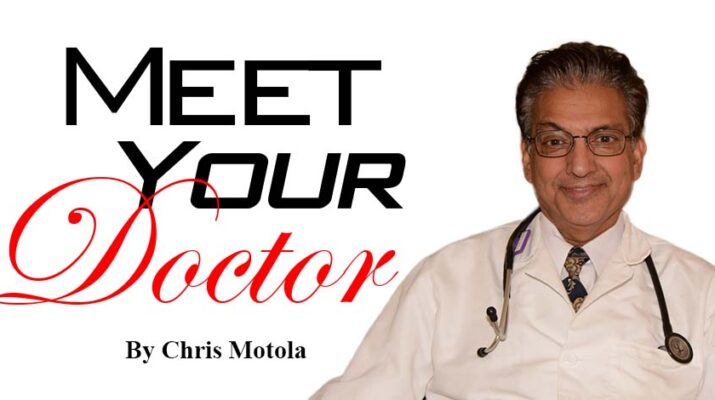Physician who practices in Henrietta discusses how ‘functional medicine’ can treat and even revert some conditions
By Chris Motola
Q: What’s the difference between integrative and functional medicine?
A: Integrative medicine is a new and very successful thing that has been spreading quickly. The definition would be the best of scientifically proven modern Western medicine along with safe and centuries-used Eastern medicine. Functional medicine came out of the Cleveland Clinic and is becoming more and more popular with doctors and patients because of its success. Functional medicine says we shouldn’t focus just on the symptoms. It says we should try to find out — if we can — the cause of the symptoms.
Q: Can you give me an example of how functional medicine would approach a symptom?
A: So if somebody has a migraine or a bad headache, we wouldn’t just stop at treating the symptom, the headache. We would try to find out the cause of the headaches. Functional medicine also focuses a lot on the gut and gut health. Gut health can be the cause of many diseases. Functional medicine uses, I believe it’s called, a functional approach. So if you have a heart attack, the approach isn’t just concerned with the heart being damaged. If you’ve had a heart attack, the whole body is sick. So they wouldn’t just focus on the heart and circulatory system. There could be some genetic weakness, some environmental toxin, stress, PTSD. There could be hidden causes. And this could also apply to something like Alzheimer’s. In Western medicine, there’s currently no treatment for Alzheimer’s. You can Google it.
Q: And by “treatment” in this case, I assume you don’t mean treating symptoms?
A: There are ways to improve quality of life, but there’s no treatment. But with functional medicine—there’s an M.D. from the University of California, Dale Bredesen; he’s actually shown that you can reverse Alzheimer’s. And there can be many hidden causes of Alzheimer’s, including genetic weakness, environmental toxins, inflammation or any combination of those things. So we’d check for these things and take proactive measures. That’s the functional medicine approach.
Q: How successful have these approaches have been in your practice?
A: My practice and my success have been to keeping up with the latest on these things. But also, my success comes from focusing on prevention. We don’t wait for the cancer to come in. We don’t wait for a heart attack. We take a preventive approach. We look at food, lifestyles and genetic factors so that we can prevent the cancers, the heart attacks. And the other part of that is even if we can’t prevent it we try to make sure we get a really early diagnosis.
Q: How do you go about that given limited time with each patient?
A: I try to encourage patients to be proactive. For example, I’ll encourage patients to monitor their own blood pressure in addition to the times we see them every three, six, 12 months. It makes it easier for us to see early warning signs and reverse it if we need to. And I encourage them every month to do a self-examination. You’ll check yourself from head to toe in the bathroom, examine your skin, the inside of your mouth. Females will palpate their breasts, males will examine their testes. If they observe anything new they can write it down and report it to me if it’s concerning. Many things, like skin lesions, can also go away from month to month, but something like a melanoma won’t. But this helps us make early diagnoses. And if you have an early diagnosis, there are a lot less complications to deal with.
Q: What’s a common disease you’ve gotten better results treating this way?
A: Type 2 diabetes. That can be reversed. Even Type 1 management can be improved significantly. High blood pressure can be reversed. Cholesterol can be lowered. Even if there’s a genetic weakness, you can get better results. We try to make treatments as natural and as comfortable as possible. Our basics start with food, of course, but also breathing exercises, regular exercises. Sometimes we give supplements. Sometimes it’s difficult to get all the necessary nutrition from food. And if we do have to give a treatment, we try to make sure it’s safe and scientifically proven and ideally not a lifelong thing.
Q: How did you become interested in these approaches?
A: Many years ago I met and spoke to Andrew Weil, who is the father of integrative medicine, after attending one of his lectures and reading his books. I had some ongoing health issues myself. I applied his principles to myself and got amazing results. I started applying it with my patients and they started seeing wonderful results as well. So that was the starting point. Now I try to continuously try to learn, because not every modality is appropriate for every patient. I tend to combine things is varying proportions, everything from medication, to exercise, to gut health, brain exercises, to mediation and breathing. I think everyone should know about all these things, but different individuals will need different things in different proportions.
Q: You’ve also studied a lot of specialties in the mainstream sense. Do you consider yourself any particular specialty?
A: Basically I was trained in internal medicine initially then did pediatrics training in Dublin. I also did OB-GYN training in Ireland. I also have some educational experience working at Sloan Kettering Cancer Hospital. I’ve also been trained and keep up to date in functional medicine and integrative medicine.
Lifelines
Name: Azhar Tahir, M.D.
Position: Internal medicine, integrative medicine and functional medicine physician at Dr. Tahir MD Internal Medicine Holistic, Natural And Functional Approach In Henrietta and Syracuse.
Hometown: Lahore, Pakistan
Education: University of Cairo; University College Dublin School of Medicine
Organizations: Member of American Medical Association; American College of Physicians
Family: Wife, five children
Hobbies: Reading, music, gardening

